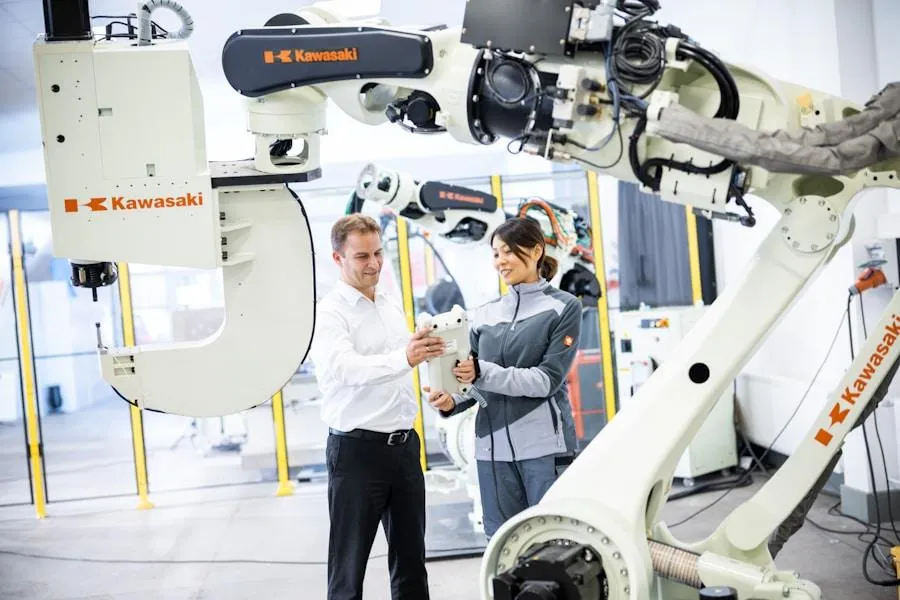THE GROWTH STRATEGIST VAULT
Insights to Turn Automation into Advantage
Learn how to identify inefficiencies, map opportunities, and design
AI solutions that deliver measurable returns.
Think Like a Strategist. Build Like a Pro

From Manual to Automated: Transforming Your Business with Process Automation
From Manual to Automated: Transforming Your Business with Process Automation
In recent years, there has been a significant rise in the use of automation in business processes. Automation refers to the use of technology to perform tasks that were previously carried out by humans. This can include anything from data entry and processing to customer service and marketing. The rise of automation in business processes can be attributed to several factors, including advancements in technology, the need for increased efficiency and productivity, and the desire to reduce costs.
One of the key drivers of the rise of automation in business processes is the rapid advancement of technology. With the development of artificial intelligence, machine learning, and robotics, businesses now have access to a wide range of tools and solutions that can automate various tasks and processes. This has made it easier for businesses to streamline their operations and improve their overall efficiency. Additionally, the increasing availability and affordability of automation technology have made it more accessible to businesses of all sizes, further contributing to its widespread adoption.
Furthermore, the need for increased efficiency and productivity has also played a significant role in the rise of automation in business processes. In today's fast-paced and competitive business environment, companies are constantly looking for ways to do more with less. Automation allows businesses to automate repetitive and time-consuming tasks, freeing up employees to focus on more strategic and value-added activities. This not only helps businesses to increase their productivity but also enables them to deliver better results in a shorter amount of time.
Benefits of Implementing Automation in Business
The implementation of automation in business processes offers a wide range of benefits for companies across various industries. One of the most significant benefits of automation is the ability to increase efficiency and productivity. By automating repetitive and time-consuming tasks, businesses can streamline their operations and reduce the amount of time and resources required to complete these tasks. This allows employees to focus on more strategic and value-added activities, ultimately leading to increased productivity and better results.
In addition to increased efficiency and productivity, automation also enables businesses to reduce costs. By automating tasks that were previously carried out by humans, businesses can save on labor costs and minimize the risk of human error. This can result in significant cost savings for businesses, allowing them to allocate resources to other areas of their operations. Furthermore, automation can also help businesses to improve their accuracy and consistency, leading to better quality outcomes and ultimately, increased customer satisfaction.
Another key benefit of implementing automation in business processes is the ability to gain a competitive edge. In today's fast-paced and competitive business environment, companies are constantly looking for ways to differentiate themselves from their competitors. Automation allows businesses to operate more efficiently and effectively, enabling them to deliver better results in a shorter amount of time. This can help businesses to stand out in the market and attract more customers, ultimately leading to increased revenue and growth.
Common Misconceptions about Automation in Business
Despite the numerous benefits of implementing automation in business processes, there are still several common misconceptions that surround this technology. One of the most common misconceptions is that automation will lead to job loss. While it is true that automation can replace certain tasks that were previously carried out by humans, it does not necessarily mean that it will lead to widespread job loss. In fact, automation can create new opportunities for employees by allowing them to focus on more strategic and value-added activities.
Another common misconception about automation is that it is only suitable for large corporations with extensive resources. In reality, automation technology has become increasingly accessible and affordable, making it suitable for businesses of all sizes. Small and medium-sized businesses can also benefit from implementing automation in their processes, as it can help them to streamline their operations, reduce costs, and gain a competitive edge in the market.
Additionally, there is a misconception that automation is only suitable for certain industries or types of businesses. In reality, automation can be applied to a wide range of tasks and processes across various industries, including manufacturing, healthcare, finance, and retail. Whether it is automating data entry and processing or customer service and marketing, businesses across different sectors can benefit from implementing automation in their operations.
Challenges of Integrating Automation into Business Processes
While there are numerous benefits to implementing automation in business processes, there are also several challenges that businesses may face when integrating this technology into their operations. One of the key challenges is the initial investment required to implement automation technology. Businesses may need to invest in new software, hardware, and training in order to successfully integrate automation into their processes. This initial investment can be a barrier for some businesses, particularly small and medium-sized enterprises with limited resources.
Another challenge of integrating automation into business processes is the potential resistance from employees. Some employees may be hesitant or resistant to the idea of automation, fearing that it will replace their jobs or make their roles redundant. It is important for businesses to communicate with their employees and involve them in the process of implementing automation in order to address any concerns and ensure a smooth transition.
Furthermore, businesses may also face challenges related to data security and privacy when implementing automation technology. With the increasing use of automation in business processes, there is a growing need to ensure that sensitive data is protected from potential security breaches or unauthorized access. Businesses must take steps to implement robust security measures and compliance protocols in order to safeguard their data when integrating automation into their operations.
Best Practices for Successful Automation Implementation
In order to successfully implement automation in business processes, there are several best practices that businesses should consider. One of the key best practices is to start small and focus on specific tasks or processes that can benefit from automation. By starting small, businesses can minimize the risks associated with implementing new technology and gain valuable insights that can inform future automation initiatives.
Another best practice for successful automation implementation is to involve employees in the process. It is important for businesses to communicate with their employees and involve them in the decision-making process when implementing automation technology. This can help to address any concerns or resistance from employees and ensure a smooth transition.
Furthermore, businesses should also invest in training and development programs for their employees in order to ensure that they have the necessary skills and knowledge to work alongside automation technology. By providing employees with the right training and support, businesses can maximize the benefits of automation while also empowering their workforce.
The Future of Automation in Business
The future of automation in business looks promising, with continued advancements in technology driving its widespread adoption across various industries. As technology continues to evolve, businesses will have access to even more advanced automation tools and solutions that can further streamline their operations and improve their overall efficiency.
One of the key trends that we can expect to see in the future is the increasing use of artificial intelligence (AI) and machine learning in business processes. These technologies have the potential to revolutionize how businesses operate by enabling them to automate complex tasks and make data-driven decisions at a faster pace.
Additionally, we can also expect to see greater integration of automation technology with other emerging technologies such as the Internet of Things (IoT) and blockchain. This integration has the potential to create new opportunities for businesses by enabling them to automate a wider range of tasks and processes while also improving transparency and security.
Overall, the future of automation in business is likely to be characterized by increased accessibility, affordability, and sophistication of automation technology. Businesses that embrace these advancements will be well-positioned to gain a competitive edge in the market and drive greater efficiency and productivity in their operations.
Case Studies: Successful Automation in Business Processes
There are numerous examples of successful automation implementation in business processes across various industries. One such example is Amazon's use of robotics in its fulfillment centers. By implementing robotics technology, Amazon has been able to automate various tasks such as picking, packing, and shipping orders, leading to increased efficiency and productivity in its operations.
Another example is the use of chatbots for customer service by companies such as Bank of America and T-Mobile. These companies have successfully implemented chatbot technology to automate customer inquiries and support requests, leading to improved customer satisfaction while also reducing the workload on human customer service representatives.
Furthermore, healthcare organizations such as Mayo Clinic have also successfully implemented automation technology in their operations. Mayo Clinic has used AI-powered algorithms to automate medical imaging analysis, enabling faster diagnosis and treatment for patients while also reducing the burden on healthcare professionals.
These case studies demonstrate the diverse applications of automation technology across different industries and highlight the significant benefits that businesses can achieve through successful implementation. As these examples show, businesses that embrace automation technology can gain a competitive edge while also driving greater efficiency and productivity in their operations.
Answers from our team.
Frequently Asked Questions (FAQ's)
What is an "Opportunity Audit"?
An Opportunity Audit is a two-week process where we analyze your workflows, identify inefficiencies, and reveal efficiency opportunities that can save time, reduce costs, and unlock new revenue streams.
Who is this service for?
Our consulting is built for startup founders and small business leaders who are scaling their operations, helping them reduce repetitive work, bring structure to growth, and identify where AI can create the most meaningful impact. While we often work with professional services firms, our approach applies to any business owner or leadership team looking to grow smarter, not harder.
Do you implement the recommended solutions after our Opportunity Audit?
Yes. After the audit, we provide a clear implementation roadmap. We can either support your team in executing it or manage the full automation build for you.
Can you prove my ROI
Yes! We use a simple but powerful ROI model that translates hours saved into annual cost savings and potential revenue gains. You'll see the numbers before making any investment.
How long does it take to see results after our AI Opportunity Audit?
We combine deep technical expertise (n8n Ambassador, full-stack development) with hands-on Project Management experience building and integrating automations for agencies and firms worldwide. No fluff—just results.
Are You Ready To
Transform Your Business?
3 Tools to Clarify Your ROI

Workbook:
Identify bottlenecks in your current processes.

Calculator:
Quantify savings and measure ROI in minutes.

Canvas:
Visualize opportunities and the path to reach them
Much more than workflows, you get clear proven data. You'll see how every recommendation is backed by measurable ROI so you know exactly why it matters, and how to get there.
0% Risk | 100% Value

We focus on the relationships
As Much As The Results
"I'm facing some things that I'm too busy to
face, but I need to face them!"
Jade N.

"Within 5 minutes of talking with Joseph you will have that confidence that you're wanting."
Mark J.


1st Shield Financial
"His knowledge and client-focused approach demonstratively delivered excellence for outstanding results."
Kim B.


360 Property Group
"He is a valuable asset for any team, he embodies the qualities of a dedicated and caring professional. I surely look forward to doing more work with him in the future!"
Mack H.

"You've done everything you said...
You instill confidence in me"
Marco B.

"It feels personal. It doesn't feel like we're
just another client"
Michael H.


Gold Harvest Group
"Working with Joseph was a breath of fresh air into the noise of marketing. He asked great questions to really get to know who I am and what my business does."
Roman L.


Symmetry Financial
I now have a team that is setting appointments for me and getting great traction to my website."
Shonda S.


Innovation
Fresh, creative solutions.

Integrity
Honesty and transparency.

Excellence
Top-notch services.
FOLLOW US
Copyright 2026. J.W. Crawford Management. All Rights Reserved.

